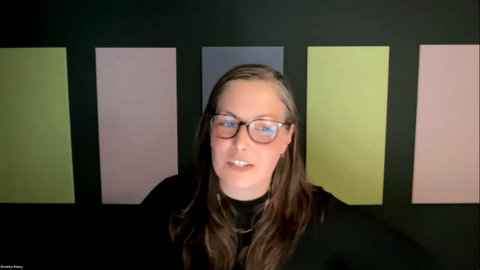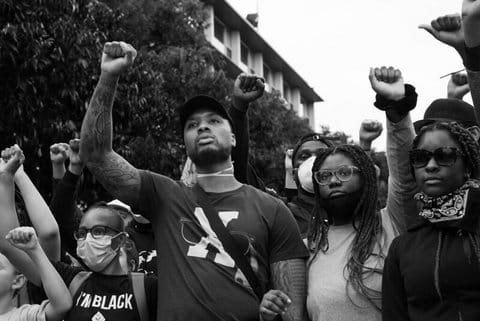
10 Apr A Trusted Adult Can Make a Big Difference in a Young Person’s Life

Brooklyn Raney, founder of One Trusted Adult, moderated an UP End Hate in February. (Screenshot captured by Samantha Kennedy / The CC Pulse)
By Samantha Kennedy
Author Brooklyn Raney likens someone’s support system to a sideline bench, where teammates, friends and other supporters can gather and cheer their friend on. For young people, Raney believes one of those important supporters is ideally a trusted adult.
“No one can do life alone or should do life alone,” said Raney, founder of One Trusted Adult, which supports student connections in schools. “When we seek out and build connections with trusted adults, we’re increasing the resources that we might have at our fingertips.”
Raney moderated the second in a series of webinars on Feb. 27 from UP End Hate, a youth-designed series run by the Eradicate Hate Global Summit to help end hate-based violence.
She said there are several benefits to a young person having a trusted adult in their lives, among them reducing hate-based violence and promoting better mental health.
Young people with at least one trusted adult in spaces they spend most of their time in are less likely to be bullied, suffer from mental health issues, feel lonely or isolated, or drop out of school, she said.
They’re also more likely to experience a higher sense of self-worth, show a greater availability for learning, and report worries or concerns for themselves or others.
>>>Teen Talk:
Identifying a trusted adult — and maintaining that relationship — comes with its own challenges. Much of that, Raney said, has to do with balance and boundaries.
One of those boundaries begins at the very start of a relationship: where trust is not assigned to any particular adult in a young person’s life but instead earned consistently over time.
“Being a space where you’re being positive about mental health, or encouraging de-stressing and not constantly on students about something,” said Brinkley Bennett, a panelist at the Feb. 27 webinar and high school student in Louisiana. “Being a space where a student can just find their refuge at.”
Bennett and other youth panelists, Taylor Bolton from Mississippi and Isa Lancaster from Louisiana, said adults being accessible and consistent in their interactions with young people was important to gain their trust.
That’s also what Raney found in her research, which included five years of research and speaking with young people, parents and educators.
“It’s the overlap of these qualities where we build trust and we beat burnout,” she said, referring to adults being accessible and caring but having boundaries. “The boundaries keep us all healthy.”
Being accessible doesn’t mean being available 24-7.
“I always say accessibility without a boundary sounds like: ‘My door is always open’ or ‘Call me anytime,’ ” she said. “Accessibility with a boundary sounds like: ‘Here’s when you can reach me’ and ‘Here’s when you will.’”
In some cases, Raney said adults won’t have all the answers a young person might need.
“The adult you reach out to might not know what to do when you reach out to an adult that you trust,” she said. “That doesn’t mean they should immediately lose your trust.”
Adults should be clear about their boundaries and what they can do to support a young person. When an adult is a mandated reporter, such as a teacher, they should be open about what they can and can’t keep between them.
Bolton and Lancaster said that discretion is equally as important when interacting with other students or teachers, so educators shouldn’t discuss a young person’s problems that aren’t required to be reported with others.
“You have those teachers where they’ll talk about what they talked about with other students, and I’ll be sitting in class like, ‘So, they told you that, and you come back and are telling us,’ ” Bolton said. “That’s how you really pick them out.”
Young people can learn more about identifying a trusted adult in their lives and what they can do to end hate-based violence on the UP End Hate website.






No Comments